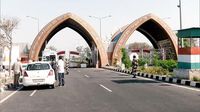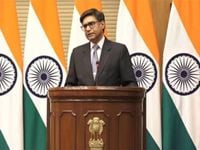Amid escalating tensions between India and Pakistan, the Indian government has indefinitely suspended the Kartarpur Corridor, a vital link for Sikh pilgrims wishing to visit the Gurdwara Darbar Sahib in Kartarpur, Pakistan. This decision comes in response to heightened security concerns following a series of aggressive military actions and retaliatory strikes in the region.
On Friday, May 9, 2025, Indian Foreign Secretary Vikram Misri announced the closure, stating, "In view of the existing security scenario, the services of the Kartarpur Sahib Corridor have been suspended till further directions." This announcement followed significant military developments, including India's Operation Sindoor, which targeted nine terror camps in Pakistan-occupied Kashmir and Pakistan itself on May 7, 2025, as a direct response to a deadly terrorist attack in Pahalgam on April 22.
The Ministry of External Affairs (MEA) had previously indicated the suspension of the corridor services, which had allowed Indian Sikh devotees to travel visa-free to one of their holiest sites. The corridor, inaugurated on November 9, 2019, has been a symbol of peace and goodwill between the two nations, facilitating pilgrimage and cultural exchange.
However, the recent escalation of hostilities has severely impacted this arrangement. Reports indicate that on May 7, around 150 Sikh pilgrims were turned away at the Dera Baba Nanak check post in Gurdaspur after waiting for over 90 minutes, highlighting the immediate effects of the closure on the Sikh community. Ramesh Singh Arora, president of the Pakistan Sikh Gurdwara Parbandhak Committee (PSGPC), noted, "The corridor is open from our side. It is a conscious decision of our government to continue welcoming the pilgrims." This statement underscores the contrasting responses of the two governments amid ongoing tensions.
In the backdrop of these developments, the situation along the Line of Control (LoC) has been marked by increased military activity. Indian forces have reported multiple attempts by Pakistan to strike military sites using drones and missiles, particularly targeting locations in Jammu and Pathankot. The Indian armed forces have successfully neutralized several of these threats, employing both kinetic and non-kinetic methods to secure their borders.
During a press briefing, Misri emphasized that Pakistan must decide whether it wants to de-escalate tensions, stating, "Pakistan only can decide if it wants to de-escalate tensions with India." This comment reflects the broader sentiment of frustration within India regarding Pakistan's military provocations and the need for a responsible approach to regional security.
On May 7, two students tragically lost their lives during heavy shelling across the LoC, a stark reminder of the human cost of these tensions. The shell, fired from Pakistan, landed near the Christ School in Poonch, injuring several others and prompting a temporary blackout in multiple towns as a precautionary measure. The MEA reported, "During heavy shelling across the LOC in the early morning of 7 May, a shell fired from Pakistan landed just behind the Christ School in Poonch. The shell hit the home of two students of the school, who unfortunately lost their lives and their parents sustained injuries."
As the situation continues to develop, the Indian government has reiterated its commitment to counter any further escalatory actions from Pakistan. The MEA has stated that India has responded proportionately and adequately to Pakistan's military provocations. Misri remarked, "India has responsibly and adequately responded to the activities carried out by Pakistan early today morning." This statement reinforces India's stance on maintaining security and stability in the region.
The Kartarpur Corridor has been a crucial lifeline for Sikh pilgrims, allowing them to visit a site that holds great significance in their faith. The corridor links the Gurdwara Darbar Sahib in Pakistan, the final resting place of Guru Nanak Dev, to the Dera Baba Nanak shrine in India. Under the bilateral agreement, up to 5,000 pilgrims per day could cross over to the neighboring country to pay their respects. However, with the corridor now closed indefinitely, the future of this pilgrimage remains uncertain.
Despite the closure from India’s side, the Pakistan government has expressed its intention to keep the corridor open, showcasing a willingness to facilitate religious tourism and maintain a gesture of goodwill amidst the current hostilities. Arora commented, "Despite the corridor’s close down from India’s side, the Pakistan government has decided to keep it open as a goodwill gesture." This highlights the contrasting approaches of the two nations regarding the management of interfaith relations.
The renewed agreement for the Kartarpur Corridor, signed in October 2024, was intended to last for five years, reflecting a mutual understanding of its importance for cultural and religious ties. However, the recent military escalations have thrown this agreement into jeopardy, leaving thousands of Sikh devotees in limbo.
As both nations navigate this precarious situation, the international community watches closely. The United States and the United Kingdom have both expressed support for India’s right to defend itself against terrorism, with Indian External Affairs Minister S. Jaishankar discussing these developments with his counterparts in both countries. The ongoing dialogue underscores the complex geopolitical landscape in which these events are unfolding.
In conclusion, the indefinite suspension of the Kartarpur Corridor amidst rising tensions serves as a poignant reminder of the fragility of peace in the region. As both nations grapple with their security concerns, the impact on innocent civilians and religious pilgrims cannot be overlooked. The hope remains that diplomatic channels will prevail, allowing for a return to normalcy and continued cultural exchange between India and Pakistan.





